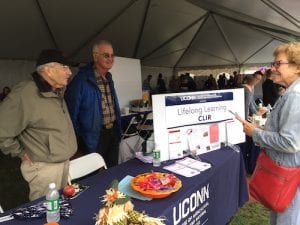
UConn Extension’s Center for Learning in Retirement (CLIR) provides meaningful and serious intellectual activities for retirees and other adults from all walks of life, conducted in an informal and relaxed atmosphere. Volunteers work to put together interesting speakers for various sessions through the year. One of these volunteers is CLIR President, Dr. Steve Kenton. With the help of the CLIR Council, a volunteer board, Dr. Kenton directs and oversees the CLIR program.
Dr. Kenton is a 1964 UConn alumnus in the Department of Mathematics and has led a busy life. He went on to graduate school and then became a Professor of Mathematics and Computer Science at Eastern Connecticut State University where he also served as the Head of the Mathematics Department until he retired in 2008. He spent two years as a volunteer for the Peace Corps in Nigeria and had various sabbaticals in Sri Lanka, New Zealand, and Thailand. Dr. Kenton enjoys learning new things throughout his life. He always stayed connected with UConn, serving as a self-defense instructor for the Women’s Center, becoming involved in the CLIR program, and most recently, working with the Alumni Center arranging a 50th reunion for the Allen House Alumni.
Steve first learned about CLIR through colleagues who were members of this Extension program. He started participating in CLIR workshops right after he retired in 2008. He has now served as the President of the program for the past eight years! Some of his duties include recruiting speakers for the workshops. This might sound like a daunting task but Steve has great volunteers on the CLIR Council who help him with most of the work. Every season there is an impressive line-up of highly educated speakers who cover a wide variety of interesting topics. Each year CLIR offers 3 sessions (Winter, Spring, and Fall) that consist of around 25 single and a few multi-week classes. He can also always rely on the UConn Extension staff to help make a successful program. The most popular classes of CLIR participants are topics on history and political science. Steve volunteers his time because he likes supporting a community of like minded lifelong learners like himself. He remarks, “As one ages, it is increasingly important to interact socially, and to be of service.”
Steve is making an impact by ensuring the CLIR Council runs smoothly and positions themselves within the overall mission of UConn Extension. With his help CLIR is financially stable. His favorite impression is when the speakers happily realize the CLIR audience are not just passive listeners–rather, they eagerly interact with the presenter. Steve can’t pinpoint a favorite speaker he has listened to through CLIR since they are all excellent but one of his most memorable classes was when Rebecca Lobo, a beloved UConn Basketball alumna, spoke to the largest audience in attendance of over 75 people (pre-pandemic). When asked if he has any advice for Extension volunteers, Steve said “Take pride in being of service to your community of interest.” It’s important to go into volunteering having a goal so you can enhance your group’s role. He also mentions that, “With the critical continuing support of the UConn Extension staff and volunteers from among our membership, CLIR has a bright future as part of the Extension family.”
UConn CAHNR Extension has more than 100 years’ experience strengthening communities in Connecticut and beyond. Extension programs address the full range of issues set forth in CAHNR’s strategic initiatives:
- Ensuring a vibrant and sustainable agricultural industry and food supply
- Enhancing health and well-being locally, nationally, and globally
- Designing sustainable landscapes across urban-rural interfaces
- Advancing adaptation and resilience in a changing climate.
Programs delivered by Extension reach individuals, communities, and businesses in each of Connecticut’s 169 municipalities. Learn more about our volunteer programs at s.uconn.edu/volunteers.
Article by Emily Syme